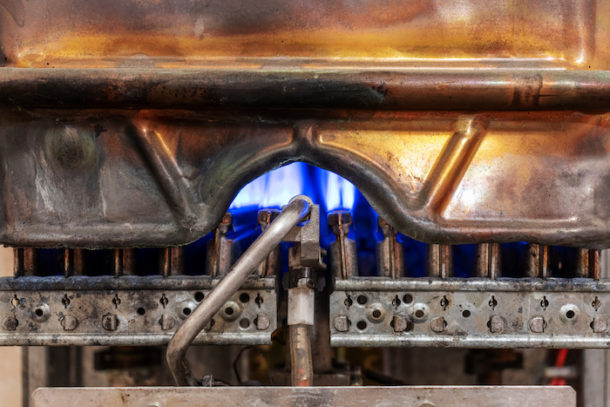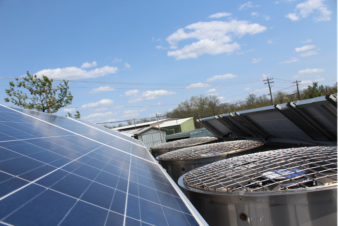Fall is here and winter is approaching. That means we are officially in heating season. While accidents happen, there are a few ways to remain cautious for a safer, incident-free winter.
Working in colder climates has some obvious challenges. For one, HVACR professionals deal with extreme weather while working long, tiresome hours near components that could be red hot. They also deal with potentially deadly gasses like carbon monoxide, propane and natural gas.

Old worn, copper gas boiler without protective casing in operation mode could lead to carbon monoxide leakage and poisoning.
Here are some ways to make sure technicians work safely around the most common HVACR industry hazards faced:
• CO Exposure — This is the biggest danger, both to you and to the homeowner or building occupants. Carbon monoxide (CO), a natural byproduct of burning natural gas, is an odorless, colorless gas that is rightly known as the silent killer. While prolonged exposure can lead to death, breathing air saturated with CO for even a short time can quickly overwhelm and incapacitate you. When working around heating equipment, you should use a CO tester to confirm you’re not being exposed. Be sure to follow all safety guidelines while installing a system to ensure no CO gets into the home or the conditioned space.
• Burns — There are multiple ways an HVACR tech might burn themselves — especially in the winter. Working close to open flames and hot elements, heating systems can put out a lot of excess heat. Plus, techs often find themselves needing to solder connections and other components — the opportunities for burns are endless. The best way to stay safe is to know where the sources of heat are and work carefully and deliberately around them. Don’t rush your work and don’t guess if something has cooled off enough to touch.
• Fatigue — Getting tired comes with the territory when crawling around in the dark and lifting heavy equipment. To avoid fatigue, get plenty of rest before starting your workday. Also, working safely is often the first thing overlooked when working tired. While shortcuts to remove extra steps may sound like a better option when exhausted, this can lead to incidents that put yourself or others in harm’s way. If you’re too tired to work safely, you’re too tired to work. Don’t risk it.
• Extreme Weather — Until furnaces start shutting down, you’re most likely working in cold crawlspaces and attics, and on slippery surfaces like ice-covered sidewalks. When the temperature drops this time of year, dress for the conditions. Durable, warm work boots can give you firm footing on icy steps. Also, cold fingers can easily drop tools, so wear warm gloves.
• Electrocution — If you’re working around electrical circuits or with live wires in an HVACR system, it’s best to turn them off at the panel. Then, hang a tag at the panel so no one accidentally turns it on. If you work with live wires, wear the correct PPE and follow all safety precautions.
Heating season is no joke. Your safety, and the safety of others, is in your hands, so keep these tips in mind when conducting service and repair calls.
By Tony Gonzalez Technical Training Manager for Fieldpiece Instruments. Tony has more than 20 years of industry experience with Fieldpiece developing new products. Most recently, he led the Job Link® App development team and developed Fieldpiece’s wireless power clamp meters. He is committed to training on best practices to help the HVACR professional do their job easier, faster and better. Tony enjoys road cycling and rooting for his hometown LA Dodgers.



